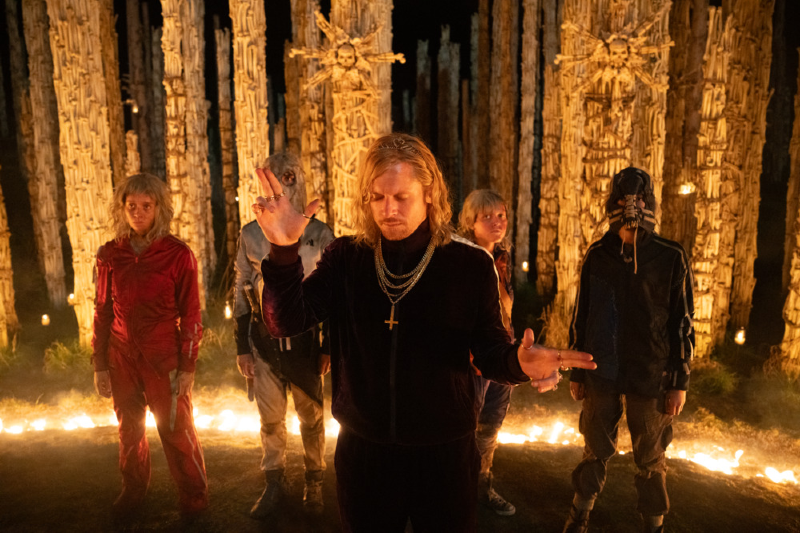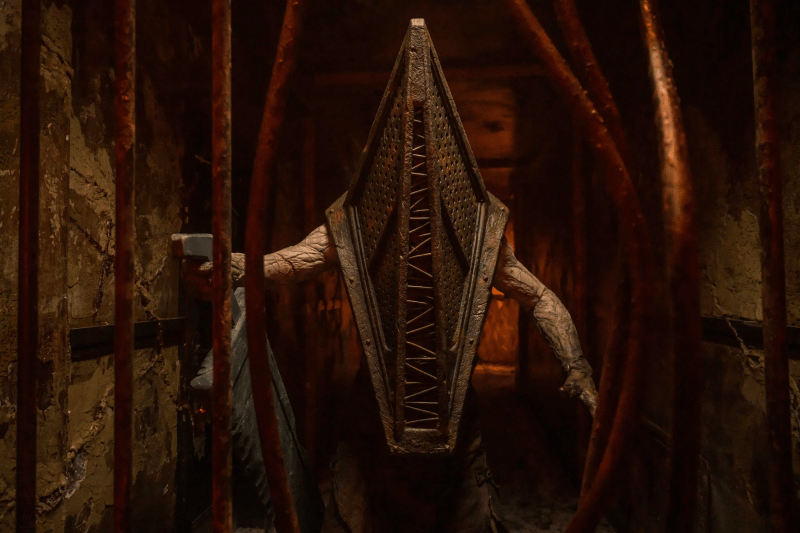In 2005, Portugal released what was then-marketed as the country's feature-length horror film, Coisa Ruim (or Blood Curse). Despite the recent festival success of co-director Tiago Guedes — he shared a director's credit on Blood Curse with fellow Portuguese filmmaker Frederico Serra — few people remember this debut 20 years later.
It is hard to understand, however, why it hasn’t been rediscovered. Blood Curse is a deceptively simple film, one in which the real horror is not immediately obvious. Made with limited means, it does not rely on special effects or cheap scares but in all its simplicity drives us towards the chilling question of whether not to believe is as much of a superstition as believing.
Set largely in rural Portugal, the film follows the family of Xavier Monteiro (Adriano Luz), a university professor and researcher. He lives with his wife Lena (Manuela Couto), his three children, Rui (Afonso Pimentel) and Sofia (Sara Carinhas) – already young adults – and the younger Ricardo (João Santos), as well as his baby grandson, in Lisbon. Upon inheriting a family home from a recently-deceased uncle, Xavier decides to move his whole family to a remote village in the centre of Portugal. Rui, being still at university, stays behind, while Lena, Eduardo and Sofia very reluctantly follow Xavier.
Upon arrival, they find the locals unfriendly and full of superstition. At first refusing to go along with what they consider villagers’ tales, Xavier and his family become increasingly perturbed by their surroundings. In an attempt to understand what is happening to them, they enlist the help of the young, self-proclaimed rationalist Father Cruz, who directs them to the older Father Vicente.
Father Vicente explains that Xavier’s great-grandfather, Godofredo, who built the house, was an immensely wealthy man determined to acquire its surrounding grounds for himself. The locals happily sold the land with the exception of one farmer, Ismael (Miguel Borges), who refused. One night, while he was away from home, Godofredo’s men brutally killed his entire family. The screams were heard by the villagers, who did nothing. It is said that Ismael is still looking for revenge.
The first shot of the opening credits features what looks like an upside down tree, whose sprawling branches take up the majority of the screen. Upon rewatching, it is immediately reminiscent of a family tree. But Blood Curse is above all a subtle film. Interspersed with more shots of trees, the connection to genealogy is not immediately obvious. Although the English title may connote intergenerational burdens, the Portuguese translates literally to ‘Rotten Thing’, which leaves much greater room for ambiguity.
At its core, Blood Curse is a film that wishes to place the burden of interpretation on the viewer. The film is concerned with several key divides: the young vs the old, the country vs the city and, crucially, superstition vs faith. But in all three instances, instead of furthering the divisions it brings the supposed opposites closer together.
Early on in the film, after witnessing Father Vicente perform an exorcism on a young girl caught masturbating, Father Cruz questions Vicente’s choice. He asks the older priest if it is not merely an issue of the power of suggestion; if he can guarantee that the girl was really possessed. The Father replies by telling him that his question is a great one, but that what the people will ask him is if he can guarantee that she was not. This is the issue that the film hinges on and that remains unresolved by its conclusion. It is also what makes Blood Curse such an interesting entry into the genre of horror.
There is very little confirmed supernatural activity in the film. While Lena repeatedly asks to leave the village for the safety of their family, Xavier, refusing to believe in the existence of ghosts, doesn’t want to. At first, the family only hears rumours of a curse, but increasingly strange things begin happening to them. Lena hears her husband call her name only not to find him in the house. Ricardo, and, subsequently, Lena and Rui see figures from the past. Dulce, the family’s maid, finds large tears in the laundry drying outside. And finally, in the film’s climax, Rui seemingly becomes possessed by the ghost of Ismael. Father Cruz, who has until now denied the existence of the supernatural, performs an exorcism.
The film embraces the idea of the power of suggestion, something that is central to the functioning of the horror genre. Through defamiliarizing shots, like a close-up of a medical textbook, we are constantly teased into thinking that something is wrong. In a brilliant moment, dissonant guitar music grows increasingly loud over a shot of a frightened Ricardo looking out of the window. When the shot turns to the window, a horror fan might expect some kind of scare, but there is nothing there.
We are also constantly encouraged to draw conclusions that are not straightforwardly evident. The most powerful example of this is when Xavier is told the story of the old carpenter, who was said to be a visionary. He had recurring visions of a funeral parade, where whoever was walking next to the coffin would be the next to die. After this, Xavier walks the same way and sees a funeral parade with a young boy next to the coffin. Seen from afar, the young boy’s face is not visible. However, when the next shot cuts to Ricardo at home the implication seems to be that the boy is him.
Is the family cursed, then? The viewer could just as easily argue that they are as that they are not. The moral implication is one debated by Xavier and Lena. Xavier tries to explain the behaviour of the townspeople: “People inherit unpaid promises, almost a century of accumulated guilt. The great-grandparents of these people let that family die without saying anything. Don’t forget the crux of Catholicism: always pay for your sins, always. Whether it takes a month or eternity.” Lena questions whether it might not be something supernatural instead. Xavier answers that it can’t be because such things don’t exist. Lena ends the argument by asking whether it is not rather because it is easier to decide that they don’t exist.
But the film leaves this issue open also. Is it easier to attribute tragic events to supernatural forces and live in fear of retribution, or to accept the evil as human and take accountability for our own sins? For the parents grieving the death of Ricardo at the end of the film, the former certainly seems to be the easiest. The influence of the supernatural alleviates the burden of their knowledge of their faults and blindspots as parents, which Blood Curse repeatedly alludes to.
Regardless, and crucially for fans of horror, the film seems ultimately to suggest that everything is interpretation. One cannot prove or disprove the existence of ghosts anymore than one can prove or disprove the existence of God. Evil exists: how we interpret it is entirely up to us.







